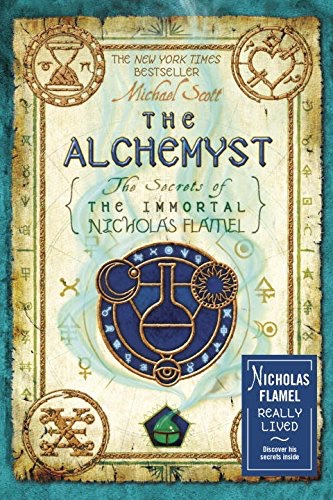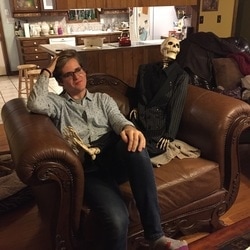 The Alchemist: The Secrets of the Immortal Nicholas Flamel by Michael Scott Review by Jarad Johnson Sometimes, we get into slumps: reading, writing, or whatever activity it may be. But personally, when I don’t feel like reading or writing on a particular day, I tend to experience what I call literary guilt. I’ve talked to some of my friends before about this, and they sometimes have the same experience, especially with reading. As my friend said to me on when I asked her if she got literary guilt, “Sometimes, but I must remind myself that no matter what format I consume them in, at the end of the day I’m here for the stories.” We think we know why this happens. Sometimes, with readers, there’s a need to consume every piece of writing, and as irrational as that is, that is, sometimes you may think to yourself that you’re not reading enough. At least that is sometimes my experience, especially when I find myself bogged down with papers or finals, and I don’t get the time that I want in a day to read. For those people who don’t get this anxiousness when it comes to books, I envy you very much. I’m reminded of the famous quote about dying with a pile of unread books next to your bed. I think that is the fate of all bibliophiles. Speaking of books, I’ve just finished a great one. It’s called the Alchemyst, and is based upon a fascinating idea, that Nicholas Flamel, a famous fifteenth century Alchemist and the central character of the series, is not in fact deceased but that he is alive and well. He and his wife Perenelle are what the book calls Immortal Humans, who like the Flamels have obtained eternal life through various means. Many of them are well known by history, such as Niccolo Machiavelli, John Dee, Joan of Arc, and William Shakespeare. All of the immortals mentioned are based off a real life historical figures or mythological beings, across Greek, Egyptian, and Celtic mythologies, among many others. Anyone who has a fascination with folklore and mythology will be totally swept away by this series, as I was. it clearly took a lot of thought and planning by the author to weave these mythologies together, and map out each of the characters, which range from the Egyptian Cat Goddess Bastet all the way through history to Palamedes, one of King Arthurs Knights. To combine all these characters, from ancient to modern, clearly shows the authors prowess on all things mythology. This alone makes it a compelling read. When I think of all the action packed and fascinating moments in the first book, one moment in particular stands out. Along with Flamel, there are two main other characters; the twins, Sophie and Josh, who possess extraordinary abilities. Josh worked in Flamels’ bookstore at the beginning of the novel, and his sister worked across the street. In the opening pages, Dr. John Dee, a longtime enemy of the Flamels, discovers that they are hiding there and attempts to capture the immortals and a very precious object that they are guarding. Dr. John Dee pursues the twins and Flamel throughout the series, and that pursuit takes them across the globe. At one point, they attempt to hide from him and his allies by going to the Elder Goddess Hekate, who lives in a secluded Shadow realm, a world she created that is adjacent to this one. When the twins meet her, she is a middle-aged woman, at night she is a bitter and elderly crone, and in the morning, she is a young girl. In mythology, she is often referred to as the Goddess with Three Faces, and is depicted with three heads usually. The author takes an interesting interpretation of the Witch Goddess, in that she changes forms with the passage of the day. The world Hekate lives in is beautifully described, with intricate imagery of the lush gardens and various ancient creatures that live there. But the description ageing process itself is superb. It serves to highlight both the Goddess’s power and her vulnerability at the same time. While she is older than humanity and immortal, he makes the Elder relatable, and brings the reader to understand and sympathize with her. Even an immortal, all powerful goddess straight out of myth has her flaws. One of the most interesting metaphors in the book is the race of Elders, who ruled over the Earth before the humans. They were diminished when their capitol city, called Danu Talis (commonly known as Atlantis) sank beneath the ocean after a terrible battle between two twins atop a colossal pyramid. Since they cannot die, they hide in the shadows, using immortal humans as agents to bring about the destruction of humanity and to return their dominion over the planet. Although the book has this to say about them, “The Elder Race divided into two groups: those who worked with the humani and those who regarded them as little better than slaves – and, in some cases, food. The Elders warred against one another in battles that took centuries to complete. Occasionally humani would fight on one side, and their exploits were recalled in great legends like those of Gilgamesh and Cuchulain, Atlas and Hippolytus, Beowulf and Ilya of Murom.” (from Chapter 18). The fall of the Elders very much reminds me of the Fall of Humanity, as depicted in Paradise Lost by John Milton. Of course, this is when Eve eats the apple, and gets her and Adam banished from the Garden of Eden. Much like the Elders, who lived in a lush paradise, until it was destroyed. But since they are not human, I think it is also even more similar and comparable to the Lucifer’s fall from Heaven in Paradise Lost. Among other things, like plotting dissent in the ranks of the angels, Lucifer fell because he refused to love the humans. This is very similar to the backstory of the Elders. As we learn more and more about this world, it is revealed that some Elders had already left Danu Talis to go work with the humans, because they recognized that their time was over, and that it was the humans turn to rule. The complexities and characters of the whole series could easily take up several more pages, but all in all I think that it’s a fantastic read, and a welcome distraction from all the horrors of the real world. Folklore and mythology have always fascinated me, and this just fuels it even more. Some of the creatures in this are from pretty obscure and lesser known cultures, so I’ve found myself learning about new mythologies that I was previously unaware of. But, even without that, I’m a sucker for good writing, and while the main plot is quite good if a little prone to tropes. The finely detailed world makes the book. That is where this series shines the most. To weave plotlines and prose the way the author has done is quite a talent, and I think can appeal to anyone who loves a good narrative.  Jarad attends Middle Tennessee State University, loves tea, and tries to spend every spare second reading. Jarad is majoring in English. Bless his heart! Let's all light a candle for him and send him happy thoughts!
2 Comments
6/15/2017 11:07:27 am
I've seen some positive reviews about this book. I'm a fan of the fantasy genre. I'm sure that I'll like this book. I've read some of the author's previous works as well. Hopefully, the characters are well built like his previous books. I'll try to look for an online copy, where I can buy over the internet.
Reply
9/29/2017 09:04:34 pm
I am really fond of reading books. In fact, I had my own library in our house. I really love to read because I want to become a writer in the future. By reading different kinds of books, I got to know the experiences of the writer. I must say that this book is really one of a kind. I really loved it. The twists and turns of the story are fantastic and amazing. I hope I can get an autograph from this great author. Congratulations and continue to share your wonderful stories with us.
Reply
Leave a Reply. |

Click Photo above to buy ebook or paperback from Amazon.
Here's the link to Barnes and Noble Or order through your favorite independent bookstore! Categories
All
|
 RSS Feed
RSS Feed